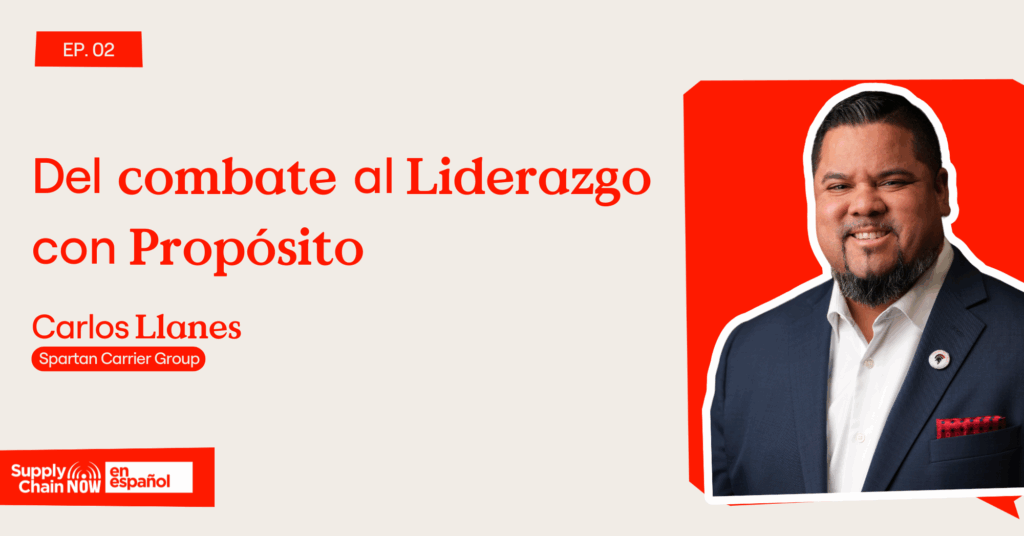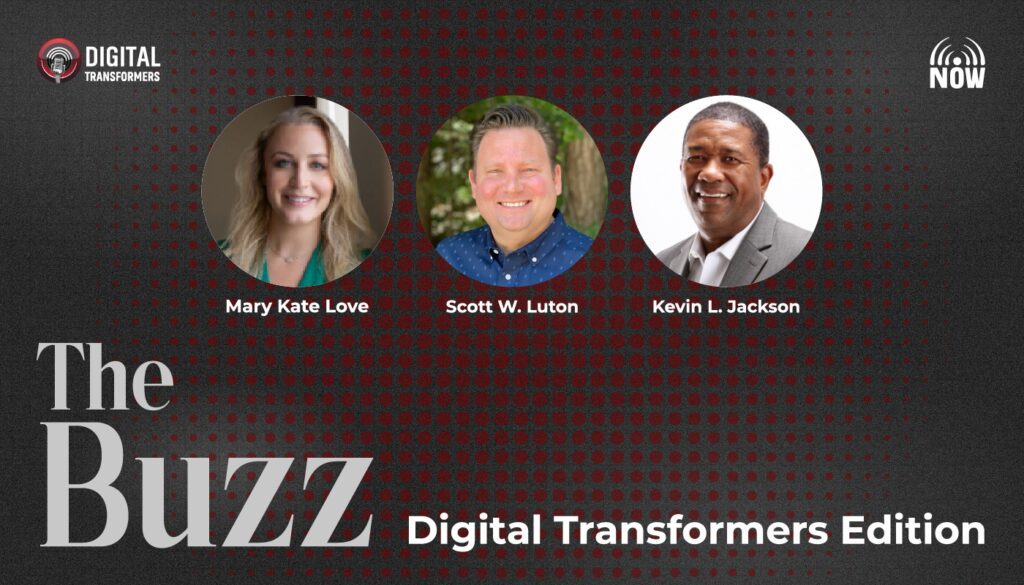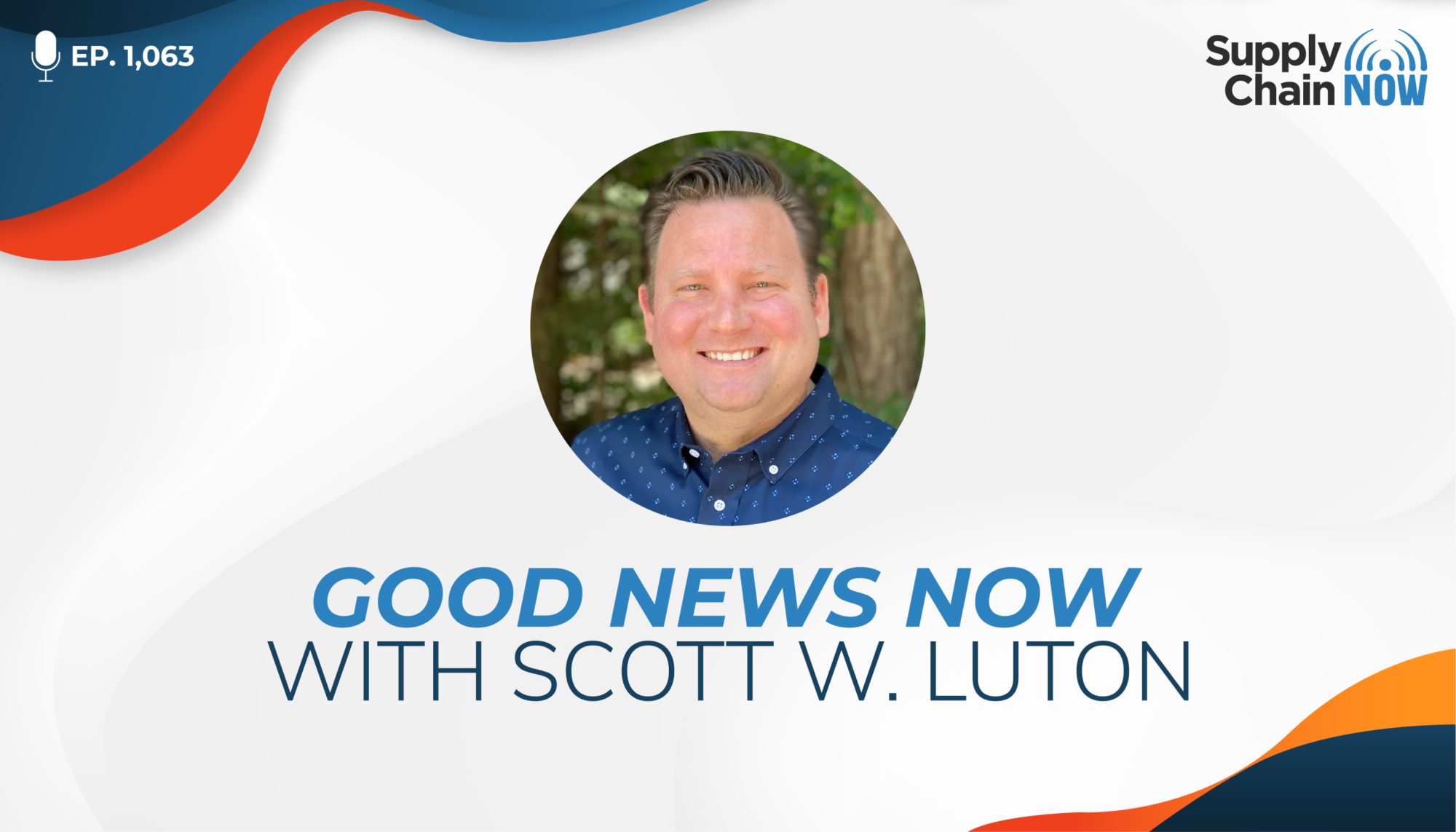Intro/Outro (00:03):
Welcome to Supply Chain. Now the voice of global supply chain Supply chain now focuses on the best in the business for our worldwide audience, the people, the technologies, the best practices, and today’s critical issues, the challenges and opportunities. Stay tuned to hear from Those Making Global Business happen right here on supply chain now.
Scott Luton (00:31):
Hey, good morning everybody. Scott Luton here with you on Supply Chain now welcome to the show. Hey, today we’re sharing a few thoughts on one of my favorite topics, good news. Some of our listeners may be familiar with my related weekly message on Friday mornings on LinkedIn. And if you’re not, connect with me or follow me on LinkedIn and join in those weekly conversations every Friday morning. I’d love to hear your thoughts up first. Today though, I wanna start by announcing a programming change that we’re making here at Supply Chain now. So after several years of publishing a new podcast every weekday, we are shifting gears to publishing a new podcast every Monday, Wednesday, and Friday. So this is in large part thanks to feedback from all of our listeners. Thank you by the way, many of who, uh, many of which have asked for a little extra time to be able to keep up with all the content that we’ve been churning out.
Scott Luton (01:29):
So we’re making this adjustment, which you may have already noticed this past week in other programming news. The Supply Chain Buzz is back live starting Monday, January 9th at 12 noon eastern time. You can find that across all supply chain. Now, social media, especially LinkedIn, you can also check out the replay dropped as a podcast every week, uh, every Friday morning. And we invite you to come join Greg White I every Monday at 12 noon Eastern time and be sure to pack your point of view. And one final programming note here, our LinkedIn newsletter with that said, will be resuming on Saturday morning, January 7th. So be sure to sign up for that. Be one of the almost 20,000 cool kids who have done just that. All right. All right, enough of all that. Let’s move right along and let’s dive into some good news now for January 6th, 2023.
Scott Luton (02:30):
And by the way, happy New Year all okay for our first item today, don’t we all appreciate new practical ways of using waste for Good? So get this. According to the Good News Network, five US states have kicked off an initiative that is focused on using unrecyclable. Say that five times fast unre recyclable <laugh>, elastic waste as paving materials for new roads. So think waste like plastic bags and spent printer cartridges, which really oftentimes just go to the landfill. So the five states that are part of this initial pilot, uh, Missouri, Pennsylvania, Virginia, California, and Hawaii. Next up, speaking of Missouri, one of those five states, Amanda and I traveled to Kansas City, Missouri last weekend and thanks to an invitation from Greg and Vicki White, we enjoyed taking in a Kansas City Chief’s football game. It was my first Chief’s game in 20 years. Lemme tell you, if you haven’t been to a football game at Arrowhead Stadium, you haven’t lived yet.
Scott Luton (03:43):
It truly is one of the best sports venues all around. Also, quick travel tip. If you find yourself in Kansas City and you’re looking for some good grub and you’ve already had your fill of barbecue, that’s required of course, that I’d highly suggest you visit Minsky’s Pizza, m i n s K y, Minsky’s Pizza, a legendary local spot that’s been serving delicious pizza since 1976. Check it out. Okay, for our third item today here on the good news, now we were just talking pizza. So let’s talk about the pizza business in particular, the $45 billion pizza delivery business. Now, the Wall Street Journal reports that the ongoing saga that is the driver shortage is now reaching pizza joints everywhere. Okay, that’s not good news. But also if you’re like me, that’s not new news. Several of our local pizza joints here in Georgia have been struggling with finding drivers for two or three years as I recall.
Scott Luton (04:49):
But as we’ve all seen companies like Uber Eats and GrubHub have not only disrupted the marketplace, but also these companies have enhanced job opportunities for drivers offering better pay and flexibility amongst other things. And that’s certainly good news, but folks, regardless of whether you get your food delivered by driver or by server tip, these people, well, they’ve had a rough go of it for a few years now, for sure. Okay, for the next couple of items I wanna share a couple of excerpts from recent supply chain. Now webinars for item number four. This first clip will be especially entertaining if you’ve ever been a fan of the late eighties and nineties show Seinfeld. Now, if you’ve ever attended our webinar programs, you may know that we oftentimes start with a fun warmup question in this webinar, which aired on December 1st of last year, we featured Michael Conley from c h tag at Walter’s Clore who spoke on the topic of supply chain planning, especially from a process maturity perspective.
Scott Luton (06:03):
But we started with our fun warmup question, which celebrated legendary comedians. And Michael hit it out of the park. Hey, take a listen. But before we get to the good stuff, we gotta start with a fun warmup question. So today Michael and Greg, it’s Richard Pryor’s birthday today. That’s right. He was born on this day back in 1940 in Peoria, Illinois. One of the best of all time for sure. So with that said, I want to ask you and all of our audience, what is one Michael, start with you. What’s one of your favorite all-time comedians?
Michael Conely (06:37):
Oh, hands down, it’s Jerry Seinfeld and the, there’s so many classics. You know, I always think of man hands where the girl is breaking the lobster at the dinner table, the, uh, the Cadillac episode where Jerry buys his parents a car and then no one will talk to them. Uh, you know, the contest, which of course is the most classic, uh, Georgia’s shrinkage at the beach <laugh>. Uh, you know, all of those are hysterical, but I, I’ll close with Festivus for the rest of us. Yeah,
Greg White (07:05):
And that one appropriate season
Michael Conely (07:07):
Almost upon us.
Greg White (07:08):
<laugh>. Yes, you’re right,
Scott Luton (07:09):
Serenity now. Serenity now. All right. My, uh, Greg that as a wonderful list and I’m a huge Seinfeld fan as well, so thank you Michael. Greg, how can you top that? What’s your one of your favorite all time comedians?
Greg White (07:21):
I doubt if I can top that and it’s really hard because I would say Richard Pryor is probably at or near the top. Um, there are so many to choose from, but the one that immediately came to mind, little bit off the beaten path, Stephen Wright, a guy who looked like he was on LDS the whole time, he was on stage and he could walk up to the microphone and just say hello, <laugh>, and the whole place would crack up just the way he said it.
Michael Conely (07:47):
I
Greg White (07:49):
Doorknob and my apartment started up, so I drove it around the block and parked it in the told people to get the hell off my lawn.
Scott Luton (07:58):
Good stuff. Love that. We got a lot of feedback around Michael’s take there. Okay, so now in item number five, Caleb Nelson, a k a, the James Webb of Interplanetary Supply Chain. Hey, how about that? Well, Caleb shared some bend there, done that perspective on the topic of three ways to future proof your Shipping. Check out this snippet here. All right, so Caleb, getting back to finishing off this top three list for future proofing shipping in 2023, where are we going next?
Michael Conely (08:29):
Yeah, I think, I think, uh, the, the last area I would suggest that a lot of shippers are focused on is, um, number one is, is ultimately understanding where they stand based upon the carriers that they’re using. What are FedEx and UPS going through right now? What are their challenges? And this is still a carrier’s market, so you have to think of it more along the lines of how does my bus business fit into FedEx or UPS’s network right now? Mm-hmm. <affirmative>, both of those areas are going through a really challenging time. And it used to be the old way of thinking about it was, Hey, I’m a big deal because I get, I do a lot of shipping with FedEx or with U P s and U P s or FedEx are gonna bend over backwards for me. They have shown time and time again that they are not willing to do that.
Michael Conely (09:18):
UPS is on a mantra of better, not bigger, and FedEx is missing quarterly targets on their earnings to a point where they are, um, absolutely doing what we say see on the general rate increase. And that is targeting, uh, very specific shippers. So if you’re shipping to residential locations, maybe to more rural locations, Greg, you mentioned that, um, it’s more costly for FedEx or UPS to deliver to those locations. And if you’re shipping, uh, boxes that are typically larger, ooh, doggies, you better, uh, buckle up for a, a a, a much greater than 6.9% rate increase that’s coming your way for sure. So it’s one
Greg White (10:01):
Of, first of all, now we know that Caleb was in fact, certifiably raised in Texas.
Michael Conely (10:06):
<laugh>. Yes, sir.
Greg White (10:09):
Um, but yeah, that, I mean, I think that’s a really good point is again, we’re talking about averages, Caleb, right? You, you mentioned that early, early on those specialty or large or whatever awkward type of items they’re gonna cost you even more.
Michael Conely (10:26):
And I think we’ve all gotten those boxes where you think, what did I order at the, at your doorstep? And it’s a massive bug. You open it up and it’s this tiny little product that you forgot you ordered, and it’s a major waste of space. Well, the carriers are now getting really picky about what kind of product and box sizes are fitting in their, uh, trucks and airplanes, and they are penalizing heavily on individuals who do not ship very efficiently. So reducing box sizes, if you know you can get a SKU or a product into a smaller box size, now is the time to absolutely be doing that because you are gonna be paying through the nose going into into next year.
Scott Luton (11:03):
Good stuff there from Caleb. And hey, y’all can register for both webinars on demand in their entirety, and you can check out that via the links on this episode page here today. Okay. And finally, in our last item of the day, you may have called the special crossover episode that we shared a couple ye a couple days ago from, uh, dial P for procurement, where host Kelly Barner share’s key business and leadership lessons she learned from her late Father Timothy James McCarthy. Two things here. So one, if you miss this episode, please do yourself a favor, find a link in today’s episode notes and listen to every word that Kelly shares. Really good stuff there. And two, we’d love to know any words of wisdom from loved ones that have significantly impacted your journey. Let us know. Email those to Amanda supply chain now.com, and we may just send out a few gifts for the best ones that we get.
Scott Luton (12:08):
All right, folks, that’s where I’m gonna wrap up today’s good news now here, uh, at Supply Chain. Now, thanks so much for joining me here today and for tuning into all of our supply chain now programming. We really appreciate all of your feedback, all of your involvement and your engagement, your great ideas, and much, much more. On behalf of the entire team here, this is Scott Luton, challenging you to do good, to get forward and be the change that’s needed. And with that said, we’ll see next time everybody. Hope you have a wonderful start to the new year.
Intro/Outro (12:43):
Thanks for being a part of our supply chain now, community. Check out all of our programming@supplychainnow.com and make sure you subscribe to Supply Chain now, anywhere you listen to podcasts. And follow us on Facebook, LinkedIn, Twitter, and Instagram. See you next time on Supply Chain. Now.



